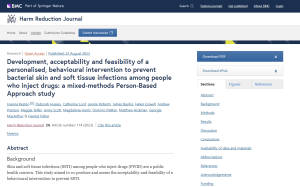Helping people who inject drugs care for their veins and avoid bacterial infection – the REACT toolkit
23 August 2023
The development and testing of the REACT (Reducing bacterial infections) toolkit has been outlined in a new paper in the Harm Reduction Journal. The toolkit aims to help support people who inject drugs care for their veins and make changes to their injecting practices to prevent bacterial infections. A small pilot study in four settings within Bristol suggests the toolkit was viewed as acceptable to people who inject drugs and a range of service providers.
The toolkit was co-produced by people who inject drugs, service providers including Bristol Drugs Project and other key stakeholders. These included researchers from the University of Bristol and London School of Hygiene and Tropical Medicine, public health experts in the UK Health Security Agency and Bristol City Council, Exchange Supplies and Linnell Communications.
Bacterial skin and soft tissue infections such as abscesses and cellulitis are common among people who inject drugs. The main cause of these infections is poor hygiene during the injection process which is contributed to in part by the places and spaces people inject in.
What did we do?
The research team took a person-based approach to develop a toolkit which includes a set of themed cards designed to support positive, non-judgemental conversations between service providers and people who inject drugs. This approach ensured the views and experiences of people who inject drugs were at the centre of the decision-making.
The final resources for the REACT toolkit include:
- Introduction manual
- A short online course for service providers
- Toolkit
The toolkit consists of cards covering the following topics:
- Handwashing and swabbing
- Use of acids to prepare drugs
- Use of water for injection preparation
- Reuse of equipment
- Rotating injection sites
What did we find?
By involving the perspectives of people who inject drugs and key stakeholders the team ensured the toolkit focused on the priorities of people who inject drugs, including pain when injecting and maintaining vein access and care. A greater emphasis was also placed on addressing environmental obstacles to safer injecting. For example, offering wipes and hand sanitiser to support skin cleaning prior to injection.
The toolkit was used by the following service providers to support conversations with 13 people who inject drugs:
- Shared care worker delivering opioid agonist treatment within a GP practice
- A nurse delivering healthcare for the homeless
- A community pharmacist
- A project worker from a women’s hostel
Interviews with service providers and people who inject drugs suggested the toolkit was well-received and viewed positively. The toolkit was seen as trying to help people through positive messaging to improve the experience of using drugs.
The cards helped support non-judgemental, two-way conversations, allowing people to share their experiences of injecting in a non-threatening, non-confrontational way. A further finding is that the toolkit appeared to support people to think about the way they inject and consider making changes to improve vein care.
Next steps
The toolkit can be used by anyone working with people who inject drugs. It could be particularly useful for increasing the reach of harm reduction advice beyond specialist drug services. Since March 2023 the team have been sharing the toolkit with relevant stakeholders, organisations and networks. It has now been downloaded more than 160 times.
The toolkit is available to download for free. The team will follow-up those who have downloaded it to understand how the materials have been used.
For more information please download the toolkit or contact Clare Thomas from the Health Protection Research Unit in Behavioural Science and Evaluation at University of Bristol on clare.thomas@bristol.ac.uk.
Paper
